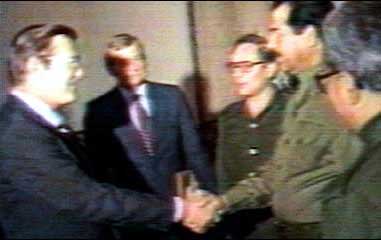Dishonor Among Torturers
[Editor's rant:
 This is a water board.
This is a water board."Drowning Torture" is what they are discussing. The Washington Post article claims that Condi Rice was concerned, and that, "Her concerns led to an investigation by the Justice Department's criminal division into whether the techniques were legal."
The Washington Post, of course, neglects to state that they are clearly illegal, and felonies under current law. Torture carries a 20 year maximum sentence, as well as the death penalty if the victim dies (as some Iraqi and Afghani detainees have actually been murdered during torture sessions). What is never mentioned in these apologetics from the mainstream corporate media is that prosecutions must proceed. If we must wait until January, when the Bush gangsters have been removed from office, then so be it. But laws have clearly been broken. There is no statute of limitations on murder and torture.]
CIA Tactics Endorsed In Secret Memos Waterboarding Got White House Nod
By Joby Warrick
Washington Post Staff Writer
Wednesday, October 15, 2008; Page A01
The Bush administration issued a pair of secret memos to the CIA in 2003 and 2004 that explicitly endorsed the agency's use of interrogation techniques such as waterboarding against al-Qaeda suspects -- documents prompted by worries among intelligence officials about a possible backlash if details of the program became public.
ad_icon
The classified memos, which have not been previously disclosed, were requested by then-CIA Director George J. Tenet more than a year after the start of the secret interrogations, according to four administration and intelligence officials familiar with the documents. Although Justice Department lawyers, beginning in 2002, had signed off on the agency's interrogation methods, senior CIA officials were troubled that White House policymakers had never endorsed the program in writing.
The memos were the first -- and, for years, the only -- tangible expressions of the administration's consent for the CIA's use of harsh measures to extract information from captured al-Qaeda leaders, the sources said. As early as the spring of 2002, several White House officials, including then-national security adviser Condoleezza Rice and Vice President Cheney, were given individual briefings by Tenet and his deputies, the officials said. Rice, in a statement to congressional investigators last month, confirmed the briefings and acknowledged that the CIA director had pressed the White House for "policy approval."
The repeated requests for a paper trail reflected growing worries within the CIA that the administration might later distance itself from key decisions about the handling of captured al-Qaeda leaders, former intelligence officials said. The concerns grew more pronounced after the revelations of mistreatment of detainees at the Abu Ghraib prison in Iraq, and further still as tensions grew between the administration and its intelligence advisers over the conduct of the Iraq war.
"It came up in the daily meetings. We heard it from our field officers," said a former senior intelligence official familiar with the events. "We were already worried that we" were going to be blamed.
A. John Radsan, a lawyer in the CIA general counsel's office until 2004, remembered the discussions but did not personally view the memos the agency received in response to its concerns. "The question was whether we had enough 'top cover,' " Radsan said.
Tenet first pressed the White House for written approval in June 2003, during a meeting with members of the National Security Council, including Rice, the officials said. Days later, he got what he wanted: a brief memo conveying the administration's approval for the CIA's interrogation methods, the officials said.
Administration officials confirmed the existence of the memos, but neither they nor former intelligence officers would describe their contents in detail because they remain classified. The sources all spoke on the condition of anonymity because they were not cleared to discuss the events.
The second request from Tenet, in June 2004, reflected growing worries among agency officials who had just witnessed the public outcry over the Abu Ghraib scandal. Officials who held senior posts at the time also spoke of deteriorating relations between the CIA and the White House over the war in Iraq -- a rift that prompted some to believe that the agency needed even more explicit proof of the administration's support.
"The CIA by this time is using the word 'insurgency' to describe the Iraq conflict, so the White House is viewing the agency with suspicion," said a second former senior intelligence official.
As recently as last month, the administration had never publicly acknowledged that its policymakers knew about the specific techniques, such as waterboarding, that the agency used against high-ranking terrorism suspects. In her unprecedented account to lawmakers last month, Rice, now secretary of state, portrayed the White House as initially uneasy about a controversial CIA plan for interrogating top al-Qaeda suspects.
After learning about waterboarding and similar tactics in early 2002, several White House officials questioned whether such harsh measures were "effective and necessary . . . and lawful," Rice said. Her concerns led to an investigation by the Justice Department's criminal division into whether the techniques were legal.
(continues)




<< Home